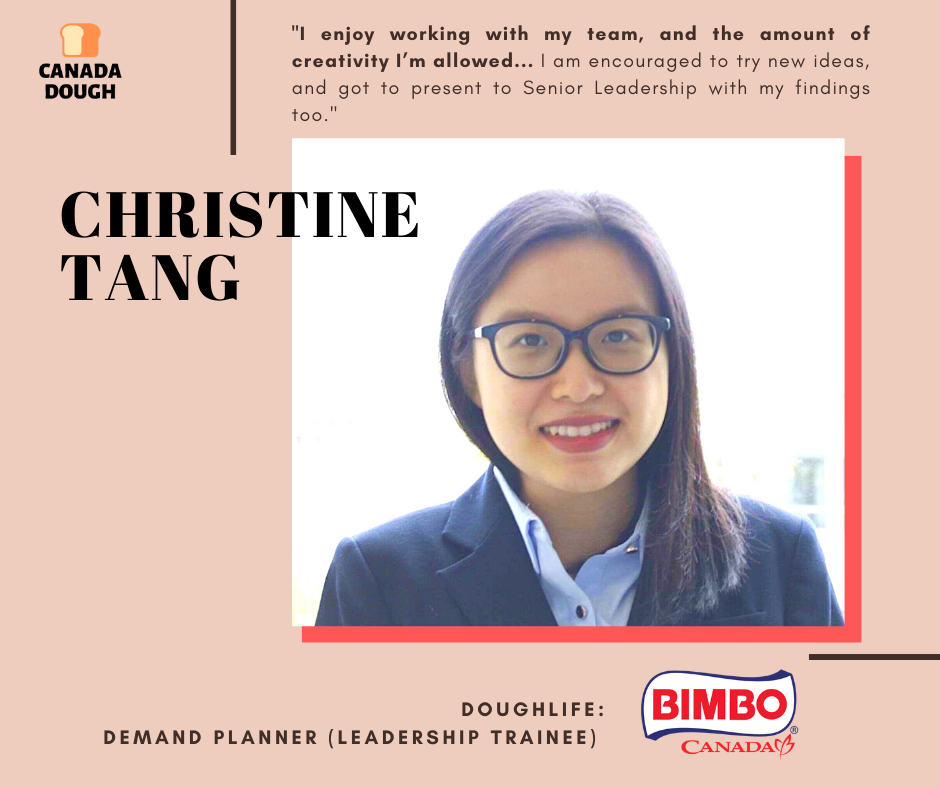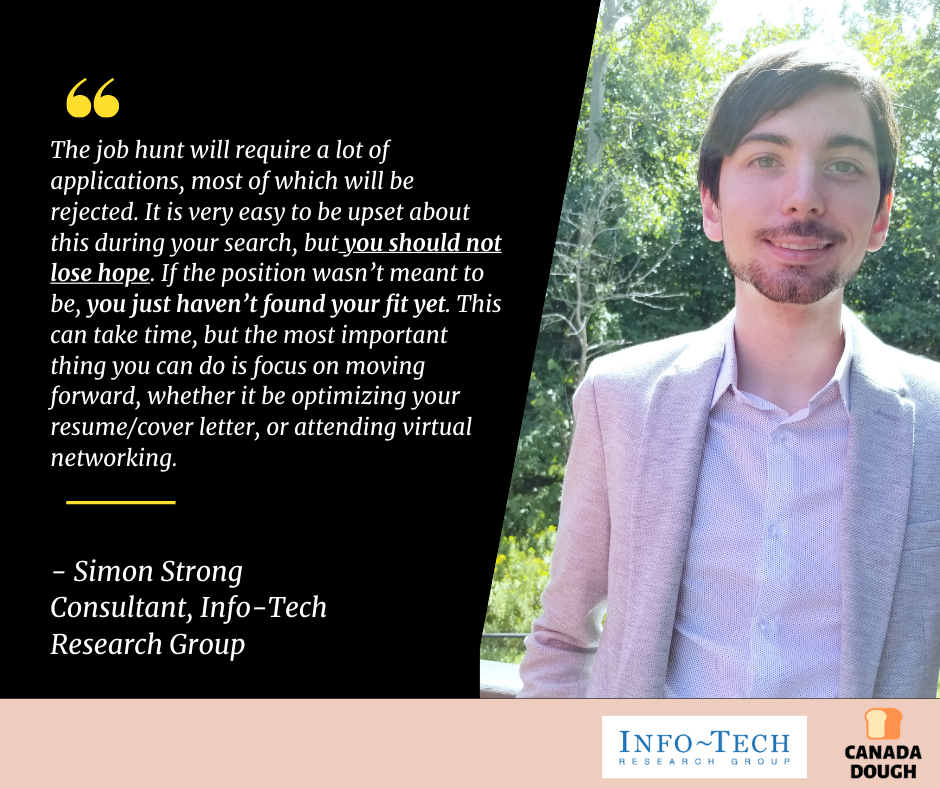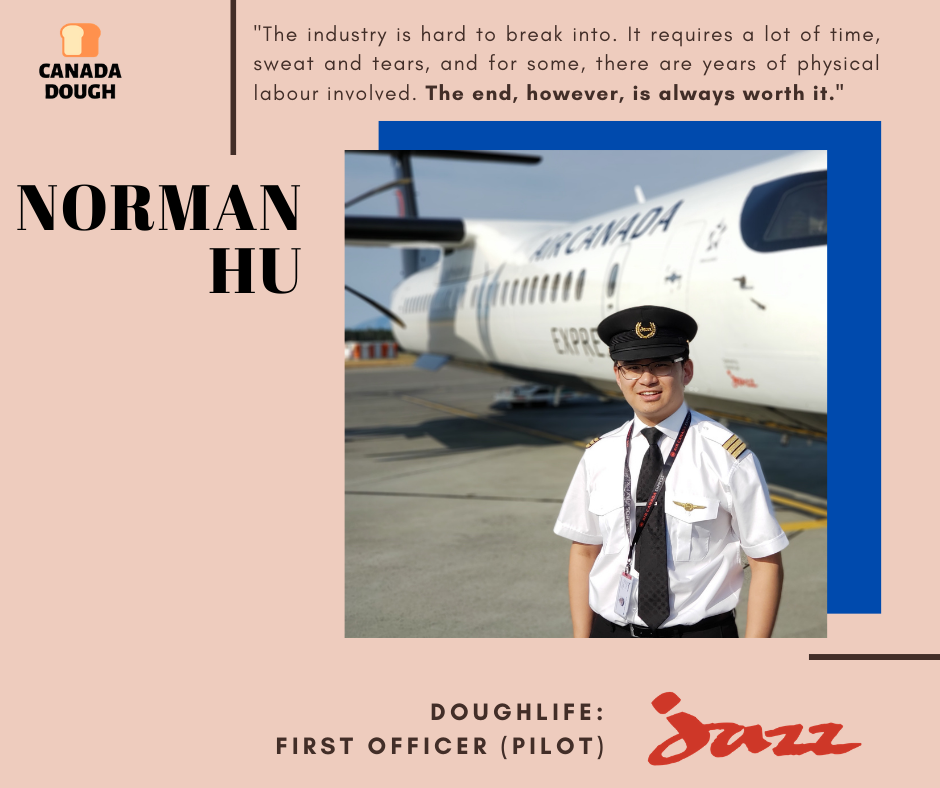Dough Life: A Day in the Life of a Demand Planner
- Canada Dough

- Oct 8, 2020
- 6 min read
Updated: Oct 14, 2020
Role: Demand Planner at Bimbo Canada (Leadership Rotational Program)

About Me
My name is Christine Tang, and I am currently a Demand Planner for Snacking Products at Bimbo Canada! I am also a Schulich 2019 BBA Alumni.
At the company, I am in the Leadership Rotational program, where there are three rotations, and each rotation is one year long. This is my 2nd rotation - in my 1st role, I was an Assistant Customer Business Development Manager in the Sales department.
Why do I love this role? Every day is a new challenge. I learned so much that school could never teach, with many new challenges and opportunities! My team is incredibly supportive, and I am immensely appreciative of everyone I’ve met.
1. What is your role? What does your job entail?
My name is Christine, I am currently in a Leadership Rotational program at Bimbo Canada (formerly known as Canada Bread). I am in my 2nd rotation as a Demand Planner for Snacking Products - each rotation is one year long.
Before COVID-19, I worked in the head office in Etobicoke, and it is now work-from-home.
In my first role as an Assistant Customer Business Development Manager in the Walmart Team, I was effectively the liaison between Walmart and the Sales department. This role involves lots of business performance analysis, and I love how I grew my technical and people skills.
In this current role as Demand Planner, I am responsible for the demand forecasting for the products in the Snacking portfolio! I work with different Sales teams and planning functions to forecast demand which is effectively an input to other supply chain processes. It’s quite different, and I love the variety!
2. What does a typical day look like for you? How is your work-life balance?
My typical workday varied based on my rotation. There are times when I can finish on the regular “9 to 5” schedule, and other times where I find myself working into the evenings.
In my first rotation in the Walmart Sales Team, it was quite more routine with the flexibility to try new things on my own accord. There would be set meetings I would attend, specific weekly reports and documents, and designated times to chat with the team.
In my second rotation, as I have a better understanding of how the business works, I have more project work. I don’t have a “typical” workday since my work would vary. I would sometimes divide my time on existing projects, or helping others, when I’m not spending individual time for forecasting.
As you could imagine, this role is challenging and growing me, in both technical and interpersonal skills! Overall, I love my work-life balance.
3. What appealed to you about this particular organization?
My company is located in the west end of Toronto, or Etobicoke. I’m also excited because my company is moving offices soon, to a modern office space.
One appealing aspect is the culture. Everyone is friendly, open and supportive, and I love this type of culture. It’s great for networking, which I strongly recommend for everyone, even after they land their desired role. You never know when that connection might be valuable.
4. What aspects of your job do you enjoy? What keeps you up at night?
I enjoy working with my team, and the amount of creativity I’m allowed. If I find a different way to solve a problem, for example, I am encouraged to experiment and try it. Going back to my technical skills and people skills component, I was given amazing opportunities, like solving problems with my technical experience, and presenting to Senior Leadership with my findings too.
As an example, in my first Sales rotation, I pitched a simple standardization solution for my company, since we do regular “Check-ups” for certain things with our banners. Not only did they take my solution, but I got recognition for my initiative and I effectively reduced my workload by 70% by implementing this!
Since March 2020, I worry about how COVID-19 is affecting everyone’s well-being and financial stability. Aside from this, nothing keeps me up at night.
RECRUITMENT PROCESS
5. What would the ideal candidate look like? Describe any relevant skills, experiences, traits, etc.
I think a misconception about job search is that lacking specific technical skills = not qualified. In some cases (like very technical roles), this is true. However, I am a firm believer that if you work towards a goal, develop your brand and network regularly, you can overcome this weakness.
The ideal candidate criteria may likely change over time, but I would say: positive, resilient, and open-minded.
6. What did the application/interview process look like for you? How did you get your foot in the door?
It was a total of 3 rounds. The first round was submitting my Resume and Cover Letter, and then afterwards, I was asked some questions. I also had the opportunity to have a phone interview with another employee to learn more about this program and the company.
Afterwards, there is a final round at their Etobicoke office, where I participated in a series of activities with different people. During one of these three rounds, you have to also do a case interview and team activities, which was a lot of fun. The case was fun, it challenges you to answer all the questions and think outside the box too.
After my time there, I left exhausted and also very happy to have met such great people!
This process has changed slightly since COVID-19 began, however, the type of testing has largely not changed for this program.
7. How did you stand out in the application process?
During the application process, I leveraged my background in Social Entrepreneurship and Market Research, as I spent much of my time at Schulich participating in social entrepreneurial activities.
One thing I learned (the hard way), was to drink lots of water and avoid caffeine on that day. You would be surprised how quickly your mouth gets dry when you’re nervous! Caffeine has some adverse effects if you are too nervous, and it dehydrates you very quickly.
Practice (but not too much). I went over the interview questions with my friends and leveraged their support. The most important - be yourself and be honest!
8. Looking back, was there anything you could have improved during your application process, or mistakes that you noticed other applicants had made?
One mistake I made was taking too long to calm down. It wasn’t until my 4th interview that I calmed down, focused on answering the questions concisely (There were about roughly 7 1:1 interviews, each one was 30 minutes long).
My first interviewer liked me, but I was rambling and far too nervous. I am very thankful this person gave me this feedback, otherwise, I would’ve botched other interviews. Afterwards, I focused up and utilized my energy to listen to the question and answer carefully.
If you can’t maintain stability over your emotions and thoughts, especially for 5+ hours, you’re at a disadvantage. It’s quite easy to slip into becoming stressed and anxious during the entire interview process by accident.
9. Were there any surprises in your job search experience or things you wished you had known earlier?
A few questions had shocked me, mostly the introspective ones that forced me to think deeply about myself and motivations. Aside from that, if you learn to calm down and think “big picture” (i.e. It’s not the end of the world if you don’t get it!), you’ll be fine.
10. What advice would you give to someone who wants to break into your role/program?
1. Take care of your mental health during the job search.
I felt sad during my job search because I was often critical of myself for taking 8+ months to find full employment. This was in comparison to my friends, who found employment within 2 months of searching. Take the time to relax, calm down, and have faith in your abilities to find a job.
2. Leverage networking.
Although it can be scary, you need to focus on multiple methods of obtaining employment. This applies to summer internships and full-time employment as well.
3. Accept rejection but don’t devalue your self-worth. You will be regularly rejected in the job search, such as in the Resume/Cover Letter Application phase.
This is normal, so please remember that this rejection is not an indication that there is something wrong with you. There may be factors beyond your control that explain your rejection. The most important thing is asking yourself: “How do I improve from here?




Comments